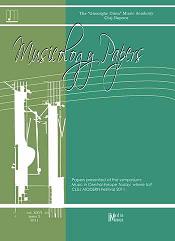THE LAST WAVE? SOME REFLECTIONS ON THE DEAD END OF MUSICAL PROGRESS AND HOW WE CAN COME OUT OF IT AGAIN
THE LAST WAVE? SOME REFLECTIONS ON THE DEAD END OF MUSICAL PROGRESS AND HOW WE CAN COME OUT OF IT AGAIN
Author(s): Reiter HerwigSubject(s): Music
Published by: MediaMusica
Keywords: progress; New Music; audience; need for music; pluralism; social communication
Summary/Abstract: Starting from the situation of music in Austria, I shall try to define what I think and what inspires me to compose the way I compose. Among the practitioners of music or those involved in music industry, and of course among the composers, there is in Vienna itself a melting pot of cultures, with very many different personalities and viewpoints. Music consists not only of tones, rhythms and sounds, but first of all of the relationship of tones, the bond of sounds, the combination of rhythms, the interaction of individual musical parameters to one another. In my writing, instead of musical “gestures”, I make new room for “speaking”, cantabile melodics, using a colorful palette of different scales, I try to give the triad new facets and set texts to music, interpreting them like Schubert or Wolf. I quite often use the same technique as the old master painters: although I have the whole picture in my head, I first paint the background, i. e. the accompaniment, the less important parts or layers of sound, so that they also receive a development with a logic of its own. Because composers today have every conceivable freedom to fulfill themselves in an individual manner. They can depict the world as ideal as we would all like it, or as bad as it is actually not, they can offer, to their heart’s content, aesthetic constructs, “sound clouds” or emotional “ear worms”.his native town, continued his musical studies in Hungary and accomplished them in Paris with Marianne Stein, Olivier Messiaen and Darius Milhaud. Professor at the „Liszt Ferenc” Academy of Music of Budapest (1967-1986); during the last decades, he has been frequently invited to hold master classes in Vienna, Berlin and Paris. He is the author of many instrumental, vocal and choral works; he has composed mostly chamber music, but also concertante and orchestral works. He has won several composition prizes, including the Erkel Prize, the Kossuth Prize, the Herder Prize, the Feltrinelli Prize, the Ernst von Siemens Music Prize, the Hölderlin Prize. He has been named Knight of the Order of Arts and Letters by the French Government and Honorary Member of the American Academy of the Arts and Letters. Doctor Honoris Causa of the „Gheorghe Dima” Music Academy, Cluj-Napoca (2008).
Journal: Lucrări de Muzicologie
- Issue Year: 2011
- Issue No: 2
- Page Range: 5-13
- Page Count: 9
- Language: English
- Content File-PDF

